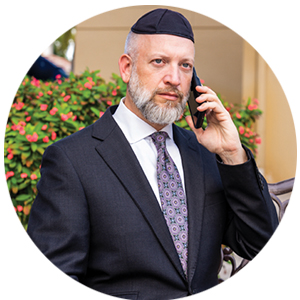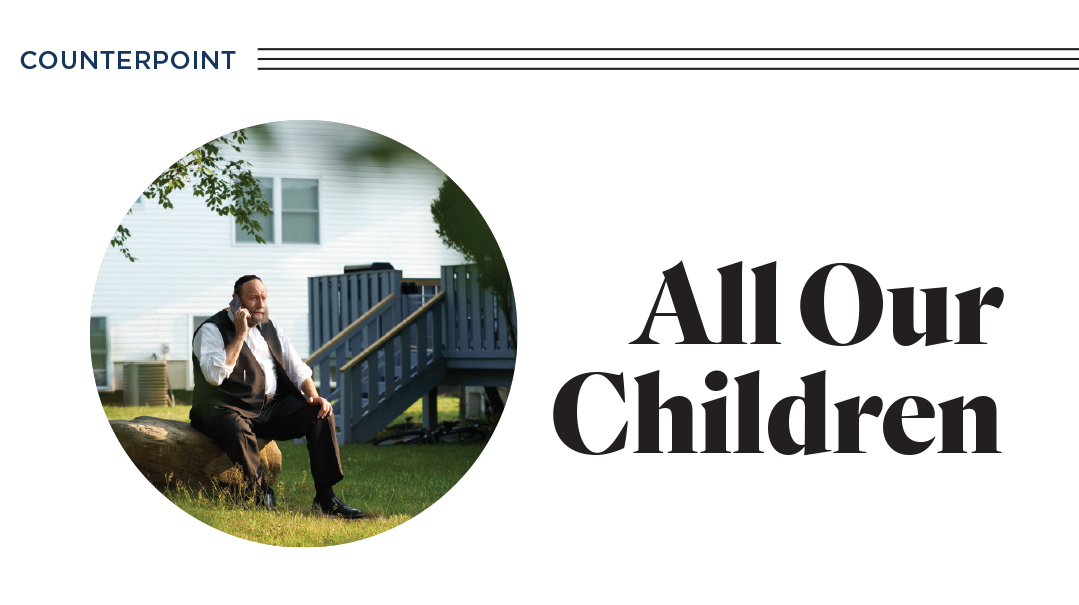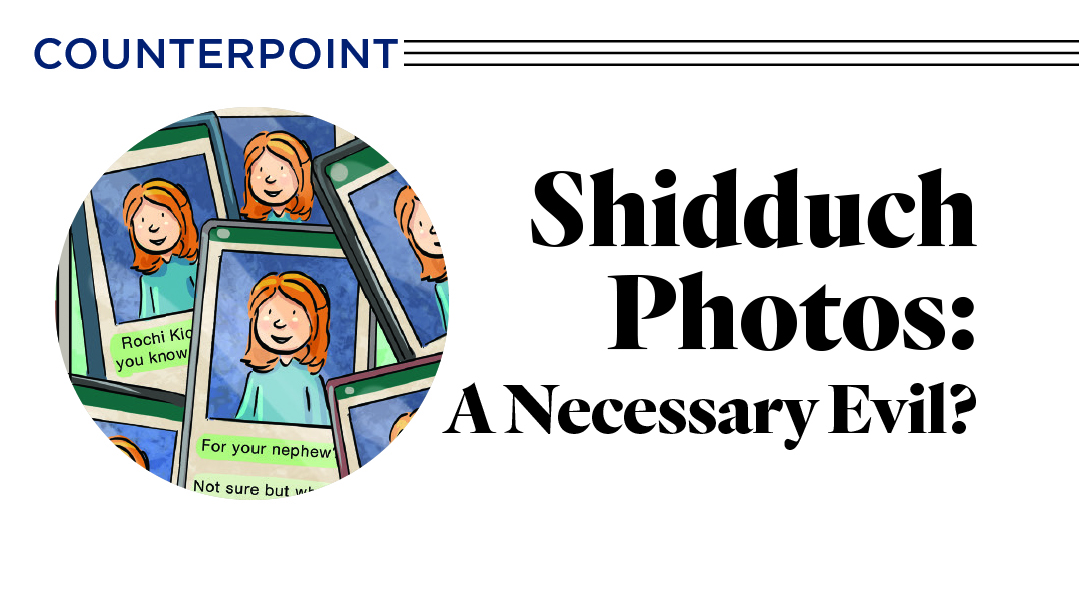No Further Questions: The Conversation Continues

Rabbi Efrem Goldberg’s call for a reset of our shidduch system drew significant responses. Here is a sampling

Committed to Questions
Name Withheld
Having married off several children and currently in the parshah with another, I take very strong exception to Rabbi Efrem Goldberg’s article, which alleged that too many inquiries are being made before allowing couples to date.
While I agree wholeheartedly that references should not be asked about medical issues, it is perfectly fair to pose those questions to the parents. Of course, I understand the need to give those with medical issues a fair shot in the dating pool, but I am going to venture a guess that Rabbi Goldberg has never been on the other side of the equation — having his child become emotionally involved in a promising relationship only to have it blow up when they find out about a previously undisclosed issue.
I have. More than once.
It is devastating to see your child heartbroken when they realize that they have to end a relationship with someone they thought was “the one” when a significant health issue was finally disclosed. (And yes, we did ask about health issues before agreeing to the shidduch and were reassured that there weren’t any.) Adding insult to injury, my son had to take the fall for the shidduch’s sudden and unexpected end on both occasions in order to protect the other side’s confidentiality, making him look bad in front of the shadchan who will likely never redt him another shidduch again. Support from friends, relatives, and others to get them through what is most certainly a trying time? That can’t happen when the real reason for the relationship’s abrupt end has to be kept secret to protect the other side’s privacy.
May Rabbi Goldberg never go through this painful and heart-wrenching experience with his children and may all of our singles find their basherts smoothly, easily, and painlessly. Meanwhile, I am going to keep asking my questions, not because I want to, but because I have learned that I have to.
Who Needs Impeccable?
M.G.
When our children entered shidduchim, I was “educated” about how résumés work by being told to focus on gaps and read between the lines for potential problems. When I asked simple questions such as, “What if they just needed more time or something came up (like real life) that changed their plans?” I was countered with: “What do you want to do, change the system?”
As parents, haven’t we been taught to focus on the unique greatness and potential for every person? Having grit and being positive are character traits that are much more useful in marriage than being “impeccable,” as a candidate was once described to me by a reference, with a sniff. Nothing shut down my interest more.
Convoluted Process
A Frustrated Rebbetzin
As a rebbetzin who is not an official shadchan but tries to help set people up, I often comment on how these days I will have the same excited reaction when a couple agrees to go on a first date as I used to when a couple got engaged. With the extensive research and the amount of steps it takes these days to simply go out on a date, it’s a miracle anyone is getting married.
Unfortunately, as a result, it is becoming increasingly disheartening to put the time and effort into making shidduchim when the result is often a dead end. What a shame if people like myself will stop trying to set up singles because of all this unnecessary frustration.
I also wonder at which point did we start taking these decisions out of our single boys’ and girls’ hands and began to micromanage their entire dating parshah. Aren’t they the ones who will be getting married? Shouldn’t they be making these determinations, without all the adults in their lives — be it their parents, shadchanim, rebbeim, or dating coaches strongly weighing in and influencing them in different directions?
What are we doing to our youngsters when we don’t allow them to choose who they want to even go out with on a date?
I hope we can come up with the necessary solutions to help our children find their voices, empower them to make their own good decisions, and to be able to set up more first dates.
We Need Trust
Ruthie Teverovskiy
Rabbi Efrem Goldberg brought up some very good points, but I found myself thinking, “But still! What are we supposed to do when we are being set up with random people?” After much thought, I came to the conclusion that we are lacking trust. Trust in the system, trust in the people who set us up, and trust in the people we date.
If we take a deep breath, trust that Hashem will bring everyone’s proper zivugim, and not panic to get married ASAP, we will hopefully be less inclined to sugarcoat everything.
I was in shidduchim for a while and was accustomed to the classic phone calls where you dig as deep as possible, because you truly have no idea who the other person is. When my husband was redt to me, however, the shadchan (a non-professional) told me straight up: “I am going to tell you everything I know about him because there is no sense in faking things. If you think this is a good idea, then go out with him. If not, then it’s not worth his time or your time to date.”
I had so much more menuchas hanefesh when I looked into and dated my husband because I knew he was not hiding anything, and I knew that the shadchan wanted us to end up happy and not just married for the sake of marriage. I implore everyone to be a little more open and honest. Then we can rebuild trust in the system and have more menuchas hanefesh and happiness.
Stop the Denial
Esther Gross
I appreciate Rabbi Efrem Goldberg’s revealing, authentic, heartwarming recently featured article.
I authored the book You Are Not Alone — a Three-Dimensional Approach to Overcoming Anxiety many years ago. My aim was to share some insight, as well as professional advice and the Torah‘s perspective on coping with anxiety, panic, and depression.
Once the manuscript was completed, I offered it to a reputable publisher and they responded, “Who suffers from anxiety? No, please don’t send us a copy! Not interested!”
Since my mission is my commission, I called another publisher, Feldheim Publishers, founded back in 1939. They welcomed my manuscript enthusiastically and published and printed it several times. Thank Hashem, it has sold thousands of copies and it is also available in Yiddish.
To all the shadchanim and those who are going through the shidduchim process — stop the denial. No one is immune. Anxiety, depression, and panic disorder can visit us all uninvited, especially since COVID-19.
Taking “medication” or being in therapy is not a problem. Not taking responsibility and not doing what is required of us to heal ourselves and deal with our personal challenges and issues — that is the problem!
If one merits to meet a lovely person who is refined, kind, caring, giving, willing to go the extra mile for others, coping with life, and serving as a role model — and also taking meds or in therapy — call your rav, discuss your options, get a brachah… mazel tov!
Ultimately what is required of us is to build a mini personal sanctuary and to serve Hashem with joy.
Where Are Our Shadchanim?
A Second-timer
I enjoyed reading Rav Efrem Goldberg’s article on shidduchim. As a divorced older single, the issue becomes even more applicable because of my past experience. I feel that sometimes people have this expectation of getting a perfect spouse, and as the Rav so eloquently expressed, no one is perfect. So the question becomes, can what I have been through collide or gel with what the potential shidduch has been through, and not automatically turn down a shidduch just because they have been through something.
I would also like to bring up another topic that I encounter as an older single. I put myself out there, send my résumé to countless shadchanim, meet with many shadchanim, and speak on the phone with many shadchanim in numerous states and even in different countries. Some are nice enough to respond that they don’t deal with older singles, but some don’t return phone calls, emails, or texts even just to let me know they don’t deal with older singles. Most single events are for the younger crowd. Where are the shadchanim that do deal with older singles? Maybe you can run an article about remembering your older singles in your community and find out who is brave enough to redt shidduchim to older singles who’ve experienced either divorce or the death of a spouse, which are both very painful to go through.
When You Don’t Ask
Name Withheld
We were the model parents that Rabbi Efrem Goldberg said we should all aspire to be. Our eldest child entered the world of shidduchim and we naively said yes without doing too much research. On two occasions, this approach hit us very hard.
After developing a relationship, a potential spouse revealed that they had suffered from severe anxiety issues. As a result, our child walked away heartbroken. On another occasion, as we sat down with potential mechutanim, they revealed that they could not assist the soon-to-be kollel couple with support or with the cost of the wedding. Not only were we unable to take on full support, we felt like this exhibited a lack of yashrus on their behalf. Once again our child walked away heartbroken.
We very quickly learned that it was our responsibility as parents to ask many questions and conduct thorough research prior to saying yes to a shidduch. Please do not make the same mistake we did. You owe it to your precious children!
Goal-Oriented Questions
A Shadchan and Shidduch Agent
Rabbi Goldberg is correct that shidduch reference checking has gotten out of hand, with questions about tablecloth colors and bank statements. Any sign of imperfection can get a great boy or girl thrown from the pile of résumés. But that doesn’t mean all questions are unnecessary.
As a teacher, I am often asked by my students to be their shidduch “agent” and help with their phone calls. Some of them don’t have parents who are on the same page as them or in the same country to help them. I have the zechus of working with individuals who are not looking for perfection, because they are well aware of what is out there, and they just want a person of fine character with whom they can build a Torah home. But, when they voice a concern about a particular issue — especially one of emotional instability, history of psychological illness, or addiction — I take it seriously. Medication need not be indicative of a future divorce situation, but the question usually needs to be asked. References often conceal information if not asked directly, and a serious psychological issue can destroy a marriage, especially in a case where they are trying to hide it.
When I call a reference and one of the first questions I ask is about psychological issues, it’s usually because I have already spoken to several other close friends of the “candidate” who have given me lots of great information, making this worth pursuing. Yet many of those wonderful references readily admit that they cannot vouch for the emotional stability of this person and that it would be best to check with someone who knows them more intimately or for a longer period of time. And that’s where these goal-oriented phone calls come in. (I tell my students that it is important for them to have someone on their list of references who can answer about their emotional stability and give a confident, true answer when asked.)
I can’t speak for those who just have a checklist in front of them and are looking for the slightest imperfection to nix the shidduch. I go into it with an open mind, an innocent-until-proven-guilty approach. But there are cases where I wouldn’t call the candidate “guilty,” rather “not shayach” for this girl or boy who does not feel ready to handle that issue in a marriage.
I think that rather than not ask the question, we need to educate better about what medication means and does not mean. First of all, someone on medication is aware of their issues, as opposed to those who are completely ignoring them. Second, not all meds are created equal. A mild antidepressant (quite common today for teens) is not the same as meds that treat bipolar disorder. And while medication for ADHD may not be a reason to break a shidduch, it could certainly help someone better understand their partner if they know that this is a challenge. A student once asked me if she should say no to a shidduch because the boy has severe ADHD. I described to her the possible mailos and challenges of such an individual so she could decide whether that was a personality potentially compatible with hers.
It is an unfortunate reality that certain issues that can make one unsuitable for marriage are not unusual. (Rabbi Goldberg writes that they are hopefully not so common, but that is not my experience.) Therefore, the questions do need to be asked, but how we then understand and filter that information will be the true test of our intentions.
I have made a few shidduchim with knowledge of problems in the family background. When the boy or girl first came to me entering the parshah, they voiced concern about their “flaws” and I would tell them what I tell all my students: If it matters to them so much, then they are not for you. You are going to find someone for whom this is a maaleh. And they did!
Disturbing Calls
L. G.
I was thrilled when I saw the cover of Mishpacha this week, and even more thrilled when I read Rabbi Goldberg’s article. I’m a 21-year-old single girl, and I get many calls from parents asking for shidduch information about my friends. I’m more than happy to give of my time, and the majority of my calls have been positive experiences. Recently, though, I’ve had phone calls that weren’t just “not positive,” but also downright disturbing.
I honestly feel that these types of phone calls are hurtful to the shidduch. Don’t believe me? Have you ever been asked to compare girls? Has anyone called you about one person, didn’t like what they heard, then asked you about someone else in the same sentence — and then asked you to compare their middos?
I have been asked to list off girls who I think meet specific requirements. I have been kept on the phone for an hour — in my opinion, the call should last max 20 minutes, unless maybe you’re good friends or relatives and are schmoozing with them. During one hour-long phone call that I will never forget, every time I answered a question, the parent would go on to explain how things are done in their home, how they don’t agree with the way the frum community does things, and how their son is such a masmid that he knew the answer to a sh’eilah that learned rabbanim in their community didn’t know. (And this was necessary to tell me because…?)
I have had callers start to ask about me and my life, which becomes super awkward. You’re calling about my friend, I want to give information about my friend, and now I’m somehow supposed to paint myself in a positive light since I’m also in shidduchim, without turning the spotlight completely on me — because you called about my friend.
If you’re calling me for information, please introduce yourself (I know this is controversial, and I’m curious to hear others’ thoughts). One mother called and when I asked who was calling, was not willing to say. I said I would prefer to know with whom I’m speaking, and without a word she hung up on me. I was taught to only give information to people who identify themselves so that my information is given l’toeles. (Again, I’d like to know what others think.) Please ask relevant, specific, “friend of the girl” appropriate questions about this girl, and hang up.
There are so many classes for single girls about how to give shidduch information, it’s about time there are classes for parents for how to get it. Maybe Rabbi Goldberg will give the first one.
Stop the Degradation
Tova Weinstein
A shadchan recently told me a story. He approached a bochur and suggested a certain girl as a shidduch. The bochur scrolled through pictures on his phone and, pointing to a picture of a girl, asked “you mean her?” She had never been redt to this bochur before. A friend of his shared her picture with him. This shadchan assures me that this is not an isolated incident among our yeshivah bochurim. Even someone who would claim that circulating girls’ photographs for the purpose of shidduchim is proper hishtadlus, should certainly agree that this is inappropriate.
Rabbi Efrem Goldberg quoted Rav Dovid Feinstein ztz”l and ybdchl”t Rav Chaim Kanievsky as stating that the practice of shidduch pictures makes no sense; one must meet a girl in person in order to see if he is attracted to her. A shadchan shared with me a story about a boy who admitted that if he had seen a picture he would never have gone out with this girl, but after just one date he saw that it was truly worthwhile to meet her.
At the 2019 Agudah convention, the issue of shidduch photos came up at two different sessions. Rav Aharon Lopiansky described a picture as “the klipah chitzonius. It’s just the body.” Rav Moshe Tuvia Lieff said about pictures that they’re “not three-dimensional. Panim means face, which means that there’s an inside, there’s a whole dimension that you don’t see. It’s very superficial, it’s more like Hollywood than our reality.”
A relationship that is built on such superficial values has very little staying power. In an era where early divorces are becoming alarmingly common, we need to take a good look at how our young couples are building those relationships. What messages are we imparting to our daughters and sons? Do they understand the inner workings of a relationship and the values that really matter in a marriage? Or are they being told, outright and subliminally, that the outer appearance is of utmost importance?
At the same Agudah convention, Rabbi Yechiel Rhine said the following: “It’s not fair to make a girl stand up against the world by herself. We need to stand up as a klal and say pictures have to stop.”
I think that we all need to step up and present a unified front stating that we will no longer stand for this degradation of the people and concepts that we hold so dear. We have the power to stand up together and say, “We will no longer look at or share shidduch pictures.” Let’s join together and show that as a community we know what is truly valuable.
I am working on creating a way to unite those who are interested in putting an end to the practice of shidduch photos. I have spoken to multiple people who are in influential positions and have the ability to assist in creating true change. The next step is in your hands. We need to show that there are many who feel passionate about this issue. A strong reaction from the collective readers will be the catalyst that can propel us toward this goal.
Please email noshidduchpics@gmail.com and affirm that you disagree with this practice that has become the norm. Please let us know your role in shidduchim (girl, mother of a girl, mother of a boy, shadchan, etc). Email addresses or names will not be shared with anyone without your permission. We are not asking for any commitments at this time, just your support in writing.
Let’s show our communities how many people are interested in joining together with the klal to bring about this desperately needed paradigm shift.
(Originally featured in Mishpacha, Issue 844)
Oops! We could not locate your form.











